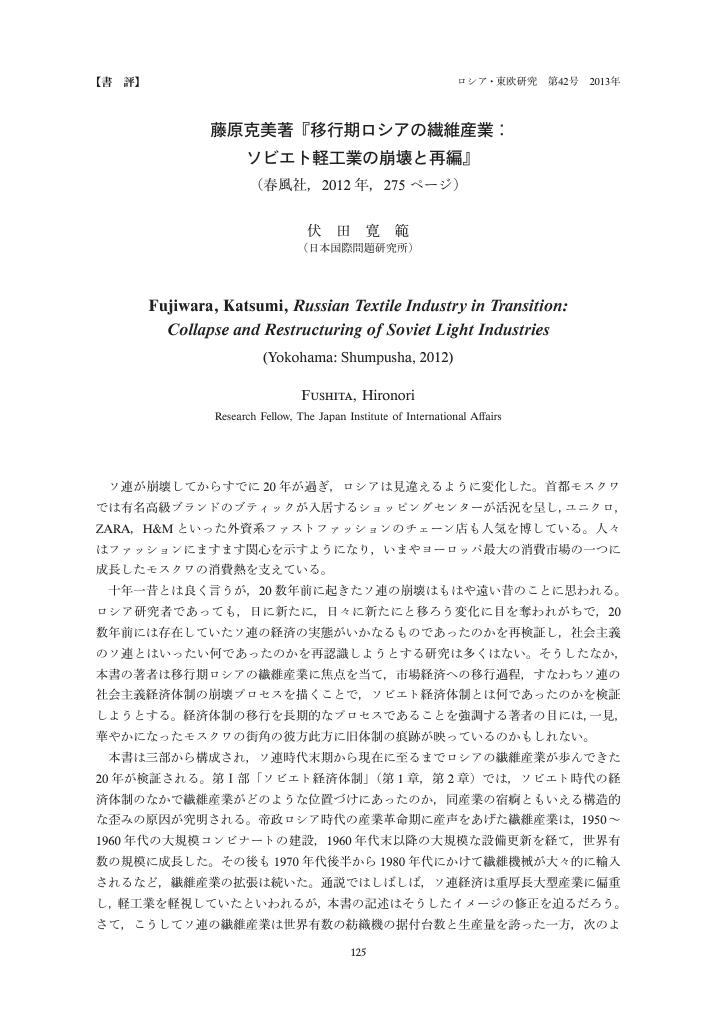12 0 0 0 OA ロシアにおける軍需産業政策と政策策定メカニズムの研究
- 著者
- 伏田 寛範
- 出版者
- Kyoto University
- 巻号頁・発行日
- 2014-07-23
新制・課程博士
3 0 0 0 OA ロシアにおける軍需産業政策の策定機構
- 著者
- 伏田 寛範
- 出版者
- 京都大學經濟學會
- 雑誌
- 經濟論叢 (ISSN:00130273)
- 巻号頁・発行日
- vol.177, no.5-6, pp.462-484, 2006-06
- 著者
- 伏田 寛範
- 出版者
- ロシア・東欧学会
- 雑誌
- ロシア・東欧研究 (ISSN:13486497)
- 巻号頁・発行日
- vol.2013, no.42, pp.125-127, 2013 (Released:2015-05-28)
1 0 0 0 OA 「ポスト・プーチンのロシアの展望」(平成30年度 ロシア研究会)
- 著者
- スゴメドフ A. K. 伏田 寛範
- 出版者
- 島根県立大学
- 雑誌
- 北東アジア研究 (ISSN:13463810)
- 巻号頁・発行日
- vol.8, pp.45-68, 2005-01
This paper is important in many ways and is strongly relevant to contemporary policy issues. On the threshold of 21-st Century the Caspian became a hot crossroad in terms of pipelines and the new cargo-transportation routes. The Caspian Basin earned the title of the energy treasure-trove of the twenty-first century. The leading American research centers look at them as an extension of the oil field of Iran and the Middle East in general. Experts of the Nixon Center for Peace and Freedom describes the area between the mouth of the Volga and Oman "The Strategic Energy Ellipse". In addition, the North-South transportation corridor is one of the largest and most strategically important investment projects involving Russia's active participation. This situation is raising extremely important problem for modern Eurasia: perspectives Caspian region in context of development security for pipelines and transit corridors. But these aspects have been largely ignored hitherto. The originality of the proposed study is following. Most international discussion of oil-pipeline and communication politics focus on the macro-politics of the process: the pattern of international relations and alliances that states enter into as part of their development strategy. Such approaches, while necessary of course, tend to overstate the homogeneity and rationality of the state as a political actor. My research will turn attention to the Meso- and Micro-politics of the process: the interregional, domestic and local political and economic maneuvering that accompanies and shapes the drawing up of pipeline projects and their actual construction and operation. So, I'm using "Mega-, Meso- and Micro-region" conceptual framework within which different political forces and incentives is address policy issues. A general context of study-long-term globalization and regionalization in Eurasia. Using this method I suggest an innovative analytical element in my article. Within this approach I'm involving a Global, Regional and Local kinds of political motives regarding the Caspian pipelines at the end 1990-s and the beginning of 21st Century. This levels represents different political interests and egoisms, social expectations and responsibilities. Thus, I scrutinize this political incentives and motives on roulette principle by unfolding all levels: from the Local to the Global. As a result currently there is no single "Great Game" in Caspian area, but a set of "games", which is consists the interests and aspirations of the main geopolitical, regional powers and the local communities as well as business-actors. This analytical approach would suggest a new imaginative perspective to area studies in general which are in blind alley (See "Slavic Research Center News". Annual Newsletter of the Slavic Research Center. Sapporo. Hokkaido University. No.11. December 2003). This paper is base on firsthand materials and studies the policy of the Russian regions along the Caspian area. My paper to date involved personnel interviews, sociological surveys, local press and documents of the Protocol Departments of regional administrations and local self-administered groups. This included interviewing members of the local administrative, representative and business entities (city and regional heads of administration and their deputies and department heads ; chairs of committees of the regional and city assemblies ; and directors and other senior staff of large enterprises) about the coverage of local policymaking, together with the objectives of it and the perceived pressure on it. Today is clear that Caspian region turned into a geopolitical apple of discord where interests of many states clash. Although there are common challenges and common patterns across the whole region such as terrorism, at present the Caspian region does not constitute a unified and homogenous whole.
